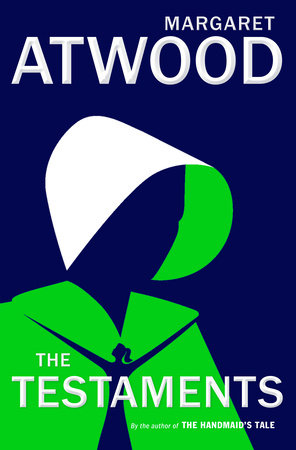Book Review

Author : Margaret Atwood
Genre : Literary Fiction/Science Fiction and Fantasy
Publisher : Penguin Random House
Year of Publication : 2019
Number of Pages : 401
My Rating : 5 out of 5
This book is a sequel to The Handmaid’s Tale. It is set fifteen years after the events of The Handmaid’s Tale. The author, Margaret Atwood, is an accomplished author whose work has been published in more than forty-five countries.
An adaptation of The Handmaid’s Tale is now an award-winning TV series. Though I haven’t read The Handmaid’s Tale, I caught a few of the episodes which gave me some background into Gilead. The Testaments still reads well as a Standalone and prior knowledge of Gilead is not really necessary to follow the story.
Atwood was selected as a joint winner of the Booker Prize in 2019 for The Testaments.

This book takes us back to Gilead, a dystopian society that can only exist in one’s worst nightmare. It is a country set up after the so called ‘Sons of Jacob’ overthrow the US Government. They are deeply unhappy with a country bedeviled by numerous ills and want to make it better. I didn’t know there was a place in the Bible known as Gilead, but it makes total sense that the country would be named after a biblical place. Or maybe it was named after another actual town in the US called Gilead.
The Sons of Jacob set up a theocratic government that has retrogressive views on the role of women in society, deeming them unsuitable for any positions of power. All steeped in religious bigotry. Women are not allowed to do any professional work. They can only be Wives, Aunts, Marthas or Handmaids.
Marthas are domestic workers for the elites whilst the sole role of Handmaids is to get impregnated and carry babies for couples who are sterile. The world has a severe fertility crisis and most adults are sterile. Many babies are born with serious genetic defects and do not survive. As in many such societies, it is the women who are assumed to be infertile, hence the Handmaids are meant to bear children on their behalf. This makes the Handmaids extremely valuable and they are forced to perform their role with no escape.

The story is narrated through the voices of three women, whose connection becomes evident as it progresses. These are Aunt Lydia, who featured prominently in The Handmaid’s Tale and two young girls, Agnes and Daisy.
Aunt Lydia is one of the founding women of Gilead. She is extremely resourceful, powerful and greatly feared. To ensure her own survival, she maneuvered her way into being placed in charge of all the women. She runs the revered Ardua Hall where Handmaids are trained and no men are allowed. She protects her position by ensuring she has incriminating information on all the senior members of Gilead’s governing council.
Agnes is a fifteen year old girl, born after Gilead was formed. She is the daughter of a high ranking Commander. Through her story, we get an insider’s perspective of how life in a Commander’s house is and the sort of upbringing that Gilead girls have. She lets us in on life at school and the transition from being a girl to becoming a Wife. Eventually, she ends up at Ardua Hall under Aunt Lydia and gives us a front seat perspective of the lives of recruits selected to become Aunts.
Daisy is a sixteen year old girl living with her parents in Canada. She only knows of Gilead through what she learns in school or sees on the news. She gives us an outsider’s perspective of Gilead, through the eyes of a young girl. She eagerly participates in anti-Gilead matches and disdains the Gilead Pearl Girls, who walk around her neighbourhood looking for fresh recruits to take to Gilead, thinking them ignorant.
This is a story of horrific treatment meted out to others in the name of religion. Those in charge take it upon themselves to decide the fate of others with rigid oppressive laws, rules and guidelines. Spies are everywhere. Disobedience is severely punished and life in Gilead is full of fear, violence and death. Serious crimes by powerful men – such as pedophilia – are, for the large part, ignored and victims are more likely to be punished for speaking out than the perpetrators. Handmaids occasionally gather to carry out a horrific execution.
Whilst this is not a story that one can call at all enjoyable, it was an intriguing look into what could happen when there is unchecked power. I loved the style that Atwood used to tell the story as I got a clear, firsthand view of events from different angles as represented by the three main characters.
Whilst I really hated Aunt Lydia in the TV series, she somehow comes out as sympathetic in this book and I found myself empathizing with her, in spite of my better judgement. I suppose that is what happens when you are able to see a character’s motivation articulated so clearly.
The book has quite a number of characters. Though many of them are totally unlikeable, they play a vital role in showing us the treachery, deception and vindictiveness pervading in Gilead. Some of them are heroes, working to end the tragedy that is Gilead. A few are even unsung heroes.
All in all, what I loved most about this tale of woe was the ending. It gets a well deserved 5 out of 5. I recommend it to anyone who loves literary fiction.
Published

